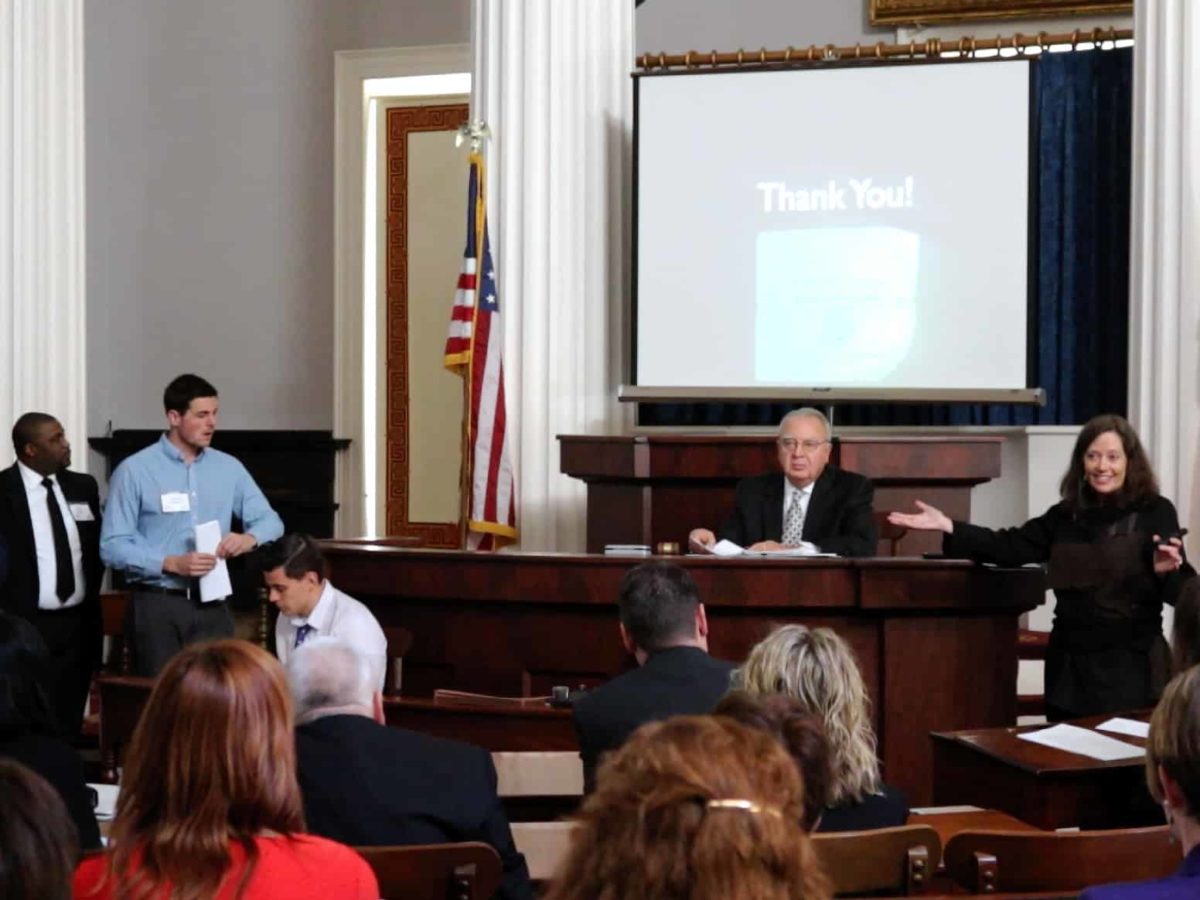

Last week a group assembled in the House Chambers of the State Capitol to re-enact the 1868 Constitutional Convention. While sitting at the same desks that would have been used by elected delegates to the convention, and looking up to the same rostra from which the president of the convention would preside, this group debated key provisions in the proposed post-Civil War constitution.
With each of these performance, the cast of volunteers and actors bring new voices. With this performance with the Education Policy Fellows Program of the Public School Forum, James Ford portrayed a forceful James Walker Hood. And while the gender was not historically accurate, Allison Steward was a pugnacious Samuel Stanford Ashley — a delegate who became our first elected state superintendent. In the 44-page script, 25 different voices emerged. Since many EdNC readers have not been able to be a part of these events, here are some of the best lines and excerpts from debates to get a glimpse of the 1868 Convention and its importance.
Constitutional state public school leader
Delegates debated whether the state constitution should provide for the elected office of state superintendent of public instruction.
Delegate John R. French:
The gentleman [Durham] objects to the office of superintendent of education. Well, sir, the education of the children of North Carolina is an “innovation.” The men who formerly occupied these seats didn’t care much for the education of the children of the poor. Well, innovation as it is, we are going to give every child, black or white, the privilege of a free school.
Delegate Plato Durham:
Now it is scarcely necessary to say that we favor free schools, as soon as the people are able to bear taxes to support them. It may be ten years before free schools are established, and if this salary run there would be a useless expense of $2,500 or $3,000. We must legislate for this State and not for Indiana or Ohio.
Delegate Albion Tourgée:
They said they are not opposed to public instruction, but counted the long time before North Carolina could be able to establish a system of free schools. If not able to have free schools, she is not worthy of a place in the Union.
About a week later, Delegate E.W. Jones argued in favor of revising the proposed term from two to four years.
I do not believe that frequent elections always promoted the stability of republican government, because of the fierceness of party wrath. At least the Superintendent of Public Instruction should hold over four years, that he might be able to accomplish something substantial.
Experience had taught us that officers for a short term began to electioneer for re-election, and thus neglect their duties. The public interest was neglected… It is not too long for the great work of organizing new ideas and to give the people time to consider and to approve.
Delegates approved both the office of state superintendent and the term of four years for state officers. This is the origin of the provisions that continue in our current constitution.
Defeat of amendment for separate schools
One of the most intense debates was sparked by Delegate Plato Durham when he proposed an amendment to provide for separate schools by race. While many spoke to the issue, Delegate James Walker Hood –- one of the black delegates — provided the most impassioned speech against it:
I am opposed to putting separate schools in the organic law. Make this distinction in your organic law and in many places the white children will have good schools at the expense of the whole people, while the colored people will have none better or what will be but little than none. I have expressed my objection time and again to the words white or black being put in this Constitution.
Delegates defeated the amendment and North Carolina did not provide for separation of schools in its reconstruction constitution – unlike many Southern states. This was changed by constitutional amendment in 1875 with the resurgence of power of those who had been loyal to the confederate cause.
Length of session
The 1868 Constitutional Convention began on January 14. In addition to creating a new constitution, they addressed many other matters critical to the state after the Civil War. To do so, they met six days a week and often held evening sessions. Adjournment had been set for March 12. Here is part of the debate on extending the session for another week.
Delegate E.W. Jones:
The Convention cannot adjourn by the 12th. What is the use to take a position, from which we shall have to recede? There must be an interchange of views. Is this all for “bunkum?”1 I cannot vote for a resolution to place delegates in a false position. I think the Convention could adjourn by the 15th or 20th. I move to substitute the latter date.
Delegate John R. French:
The interchange of views spoken of, is the very trouble which this Convention encounters. The calling of the yeas and nays on irrelevant questions is another trouble. Old musty speeches are drawn out and delivered here. Every interest of the State—her famishing people and languishing resources, all demand prompt action and an early adjournment. The people are anxious to vote for the constitution. Let the Convention adjourn and go home on the 12th, or cease to draw its one thousand dollars a day.
The session was extended: they concluded their business on March 17. By contrast, the General Assembly also began its long session on January 14 this year and finally concluded on September 30.
Last day of the Convention
The last day was a celebration of what they had accomplished in setting a course for the state along with conciliatory speeches.
Delegate and President of the Convention Calvin Cowles:
We break up this circle to return to wives, children and friends, bearing in our hands the charter of their liberties — a Constitution guaranteeing liberty, ensuring justice, and conferring the means to knowledge on all, the high as well as the lowly man.
Delegate Albion Tourgée:
Mr. Chairman, it is fitting that I should say something at this time. As one of the youngest members of this Convention, I desire to say that if in the heat of debate I have said anything that has wounded the feelings of any member, that I forgot it as soon as it was over. And now, when we are about to part, I call upon the Conservatives of this Convention to meet us half way.
Delegate Plato Durham:
The Conservatives reciprocate the sentiments uttered by the gentleman from Guilford.
This exchange was significant given the intense debates between these two delegates. Tourgée, a native of Ohio, was a strong leader in the convention, highly opinionated, and occasionally brash. A more tender side of his personality is seen in the letters he wrote while at the convention to his wife, Emma. This is part of his letter he wrote toward the end of the convention, on March 6.
My Dear Wife:
Your letter was received this morning and I was very glad to hear from you. You seem to be in very good spirits and really I am rejoiced to know that it is so. I had intended to come home tomorrow evening but you may not see me, as you seem to think you can get on without me.
There is no doubt that the constitution will be ratified by a large majority and a republican nomination will be very nearly equivalent to an election.
It is a little unfortunate in some respects that you are not a man but on the whole, I am not a little grateful that you are of the feminine gender. Keep them all in good heart and God will be with and help us.
Yours devotedly
A.W. Tourgée
The purpose of the Constitutional Tales — which includes these re-enactments — is to help us understand our Constitution. But it is also intended to be a reminder of the solemnity of creating the organic law of the state, the power of building coalitions, and the humanity of each person involved.


